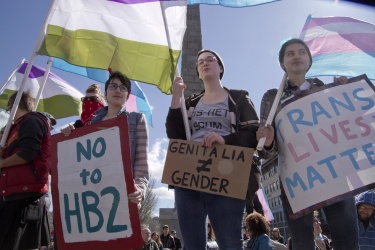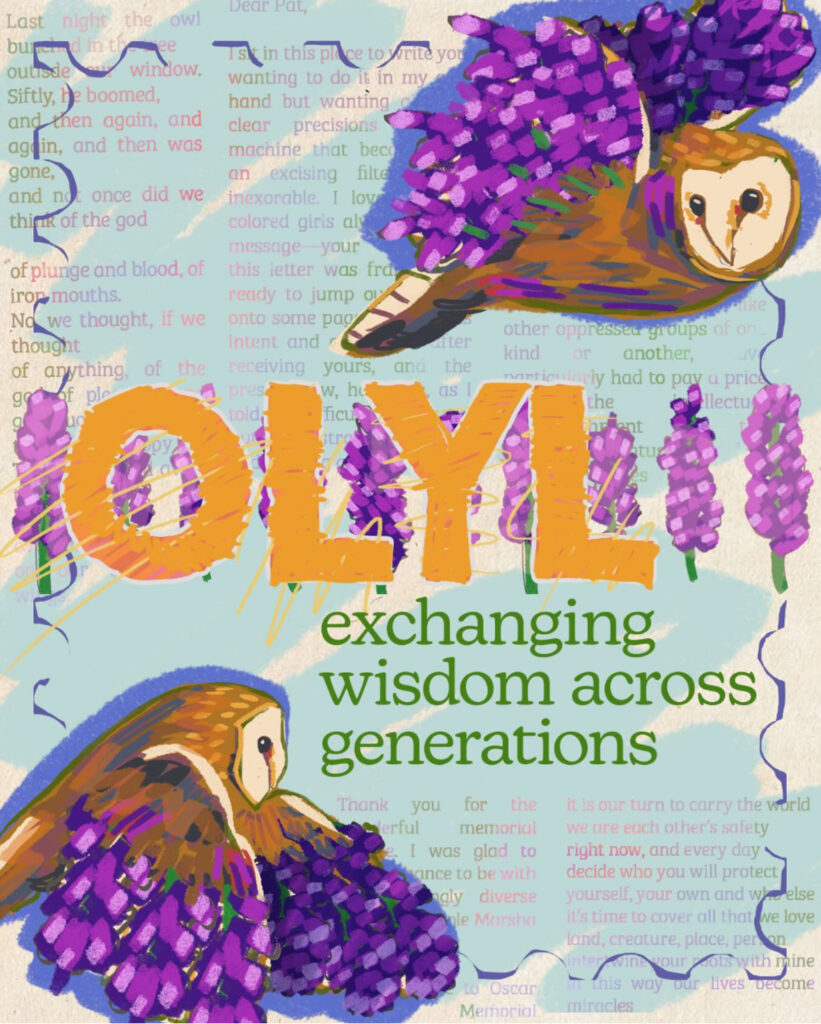Trans Allyship in a Trump Presidency

A few months ago, I wrote that, for trans people, it felt like “a time of cautious possibility, a time of uneasy fear.”
It’s no coincidence that trans people are living through an age of both unprecedented visibility and unprecedented violence. Trans people know all too well that being seen and being targeted often go hand in hand; the more witnessed you are in your difference, the more likely you are to attract backlasah. Right now we’re seeing this play out on a national scale for not only trans people, but also many other marginalized groups: queers, Muslims, immigrants, people of color, women, and more.
A few months ago, I wrote that, for trans people, it felt like “a time of cautious possibility, a time of uneasy fear.” Now, with a Trump presidency on the horizon, it feels much more like the latter.
In the past few years, we have seen tremendous steps forward. Greater numbers of trans people than ever before have access to basic rights like protection against workplace discrimination, the ability to change their government IDs to accurately reflect their name and gender, and the ability to receive insurance coverage for life-saving health care. However, all this seems to hang in the balance now. Trump is poised to roll back much of our legislative gains on the national level. Particularly at risk are regulations instituted via guidance or executive orders from the Obama administration, including a ban on discrimination against LGBTQ federal employees, guidance providing transgender students equal access to gendered facilities such as bathrooms and locker rooms, protections against housing discrimination, guidance making it easier for trans people to update their passports, and more.
As the trans community rushes to prepare for the new administration, today we recognize the annual Trans Day of Remembrance. Today, we pause to mourn the many trans people who have died in the last year, and we pause to gather strength to continue the struggle. Now more the ever we need non-trans allies to join us in this fight.
So what does allyship with trans people look like during these uncertain times? What is the role of non-trans people in our struggle? Read on to explore how you can more deeply embody your commitment to trans liberation.
Acknowledge What’s Happening.
Life does not feel like business as usual for trans people. Even before the election, we were navigating the double-edged sword of visibility: the hope for representation, the fear of violence. Now more than ever, we are in crisis mode, scrambling to make decisions about our bodies, our health care, and our legal statuses on accelerated timelines before January 20, 2017. Checking in with the trans people in your life, and acknowledging the reality and the weight of this moment is a starting point. We need to hear that you are not complacent, that you refuse to accept the current political climate as the new norm.
Prepare Yourself To Speak Up.
One the most practical skills you can add to your ally tool belt right now is bystander intervention training. We know that hate crimes of all kinds are on the rise, and for many trans people this kind of violence is already a regular experience. If your coworker makes a joke at the expense of trans people, if you witness a stranger assaulting a trans person on the subway, if you hear violent transphobic language on the street, do you know what to do? It’s one thing to know you want to speak up and counter oppressive behavior. It’s another thing to actually be prepared, to be ready to override your fight-or-flight response and use your words to diffuse conflict and protect the people being attacked.
Center Trans Voices.
Representation is powerful. It makes real the possibility of trans existence. When trans people see their peers living nuanced, thriving lives, it illuminates a way forward; it says, I’m doing this, and so can you. Make space for trans people to tell their own stories, in their voices, on their own terms.
If you’re in a room full of people talking about or making decisions that impact trans people, make sure there are actually trans people at the table, preferably in leadership. Thinking about including a trans character in your web series? Enlist a trans person to write it instead. Contemplating running a gender diversity training at your workplace? Pay a trans person to facilitate it. Creating a program for trans youth at your community center? Hire trans people to design and run the workshops.
This is about not only affording trans people agency in situations that deeply affect them, but also about the work of resource redistribution. Trans people face significantly higher rates of workplace discrimination and unemployment — hiring trans people, especially to do jobs that affect the trans community, is vital to trans survival.
Celebrate Trans Lives.
Trans lives deserve to be seen in all their complexity — the joy along with the pain. Educate yourself about trans history and the nuance of trans experience. Avoid simplistic tropes about the inevitability of trans struggle and suffering. Honor the revolutionary alternatives that we are already creating for ourselves. Learn from past generations of trans community leaders, who gave us, among other things, the transformative organizing tactics that birthed the Stonewall riots and the modern queer rights movement. Many beautiful storytelling projects are preserving trans history and celebrating the diversity of trans life. Check out Her Story, This is Me, My Genderation, and We’ve Been Around for more.
Take Language Seriously.
Language matters. When we phrase something a certain way — like “all genders” instead of “both genders,” or “female assigned at birth” instead of “born a girl” — we’re telling our brains that’s how it is, and we’re saying that to other people too. Language carves grooves in our brain.
The work of supporting trans people’s survival is the work of rewiring the way our brains understand gender, of undoing the gender binary that mediates all our interactions. And that starts with paying attention to our words. Read up on best practices around trans-affirming language, including using the correct pronouns, no matter what era of a trans person’s life you’re talking about; saying “transitioned” instead of “became a woman;” saying “male assigned at birth” instead of “born a boy” or “biologically male;” and making gender neutral greetings like “folks” or “friends” a habit, rather than “ladies and gentlemen.” Start with a few, practice, and keep adding. These are the building blocks of a future where all trans people thrive.
Finally, at the core of this language shift is the allyship prime directive: listen to trans people. By using the words that trans people say most honor their identities and keep them most safe, you are telling trans people that they matter. You are reminding them — and your brain — that the truth of their experience is respected and protected.
Yes, Sweat the Small Stuff!
The trans allyship starter kit often includes actions that are considered to be the low-hanging fruit of affirming trans people: not commenting on or asking about people’s bodies, using the correct pronouns, creating gender neutral bathrooms at your workplace, etc.
At a time when we desperately need seismic, structural change to protect trans (and black, brown, Muslim, and immigrant) lives, it might be easy to discount these actions as superficial and inadequate. But I want to affirm that these small acts of allyship matter when placed within a larger commitment to systemic change.
It’s not about one good deed (one correct pronoun, one gender neutral bathroom) saving the world. I believe in the power of the cumulative effect. No matter what, with every choice you make, you’re creating patterns. You’re either affirming the status quo or charting a course toward a new one. So, make the right choices. Create the right patterns. Choose, moment by moment, to course-correct toward the world you want to build, toward your vision of your best self and your strongest community. Build it day by day.
What’s both challenging and encouraging about perilous times like these is that, in many ways, the work is already cut out for us. We know what we need to do. We just have to do it. Bit by bit, day by day, we have to stay the course. Allyship is a muscle. Work it.












